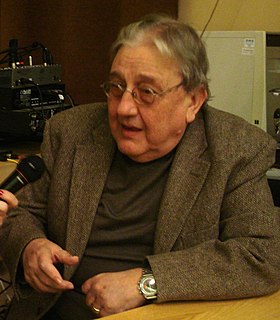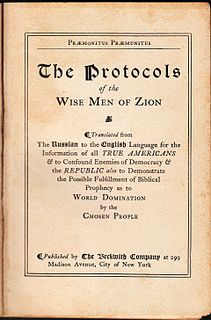
Wisden Cricketers' Almanack, or simply Wisden, colloquially the Bible of Cricket, is a cricket reference book published annually in the United Kingdom. The description "bible of cricket" was first used in the 1930s by Alec Waugh in a review for the London Mercury. In October 2013, an all-time Test World XI was announced to mark the 150th anniversary of Wisden Cricketers' Almanack.

Sergei Aleksandrovich Nilus was a Russian religious writer and self-described mystic.

Pavel Aleksandrovich Krushevan was a journalist, editor, publisher and an official in Imperial Russia. He was an active Black Hundredist and was known for his far-right, ultra-nationalist and openly antisemitic views and was the first publisher of The Protocols of the Elders of Zion.
Wise Music Group is a global music publisher, with headquarters in Berners Street, London. In February 2020, Wise Music Group changed its name from The Music Sales Group.

Little, Brown and Company is an American publishing company founded in 1837 by Charles Coffin Little and James Brown in Boston. For close to two centuries it has published fiction and nonfiction by American authors. Early lists featured Emily Dickinson's poetry and Bartlett's Familiar Quotations. Since 2006 Little, Brown and Company is a division of the Hachette Book Group.

Cesare G. De Michelis is a scholar and professor of Russian literature at the University of Rome Tor Vergata, Italy.
Baronius Press is a traditional Catholic book publisher. It was founded in London, in 2002 by former St Austin Press editor Ashley Paver and other young Catholics who had previously worked in publishing and printing. The press takes its name from the cardinal Cesare Baronius, a Neapolitan ecclesiastical historian who lived from 1538 to 1607. Its logo is a biretta, which together with a cassock forms the traditional image of a Catholic priest.
Michael Hagemeister is a German historian and Slavist, an authority on The Protocols of the Elders of Zion and on Sergei Nilus.
Boris Leo Brasol, lawyer and literary critic, was a White Russian immigrant to the United States.
James Ripley Osgood (1836–1892) was an American publisher in Boston. He was involved with the publishing company that became Houghton Mifflin.
George Shanks (1896–1957) was an expatriate Briton born in Moscow and was the first translator of Protocols of Zion from Russian into English. He was also a founding member of Radio Normandy. George Shanks was the son of Henry Shanks, a well-known British merchant who resided in Moscow. Henry Shanks managed the family firm of Shanks & Bolin, Magasin Anglais established by his father James Steuart Shanks in 1852. As a result of the Russian Revolution of 1917, the family lost their business and home and were forced to return to London. It is believed that the translation was completed during this period in London. His identity was not discovered until 1978; initially, it was believed that Victor E. Marsden was the translator, as his name came to be associated with the British English language translation of the Protocols in pamphlet or booklet form soon after he died in 1920.

Harris Ayres Houghton was a physician and member of the United States military intelligence community during and shortly after World War I. He is notable for having arranged the anonymous translation and publication, from the Russian language into the English language, of the Protocols of the Elders of Zion in the United States in 1920. The lead title he was responsible for producing was "Praemonitus Praemunitus."
Natalie de Bogory (1887–1939) is primarily known for her work in translating from the Russian language into the English language, and subsequently distributing and participating in having published the first or second American edition in the United States of the document known as the Protocols of the Elders of Zion. There were two different editions printed in the United States in 1920. The earlier, entitled The Protocols and World Revolution, associated with Boris Brasol and published by Small, Maynard and Company. The later, entitled Praemonitus Praemunitus associated with Harris A. Houghton and published by the Beckwith Company.

The Beckwith Company was a publishing entity in 1920, based in New York City. It is remembered for publishing a second edition of the forged Protocols of the Elders of Zion, more specifically a second translation from the Russian language into the English language.

William Stanley Beaumont Braithwaite was an African-American writer, poet, literary critic, anthologist, and publisher. His work as a critic and anthologist was widely praised and important in the development of East Coast poetry styles in the early 20th century.

Hippolytus Lutostansky (1835–1915), also transliterated as Lutostanski, Liutostanskii, J. J. Ljutostanski, Ippolit Iosifovich Lutostanskiĭ; Polish: Hipolit Lutostański, was a former Catholic priest of Polish extraction in the Russian Empire, a convert to the Russian Orthodox Church and an antisemite.

The Protocols of the Elders of Zion or The Protocols of the Meetings of the Learned Elders of Zion is a fabricated antisemitic text purporting to describe a Jewish plan for global domination. The hoax was plagiarized from several earlier sources, some not antisemitic in nature. It was first published in Russia in 1903, translated into multiple languages, and disseminated internationally in the early part of the 20th century. It played a key part in popularizing belief in an international Jewish conspiracy.
Znamya was a newspaper established by ultra-nationalist Black Hundreds journalist Pavel Krushevan in Petersburg. It is known for publishing of the "Protocols of the Elders of Zion" in August–September 1903.

Norman Hill White was an American publisher and politician.










